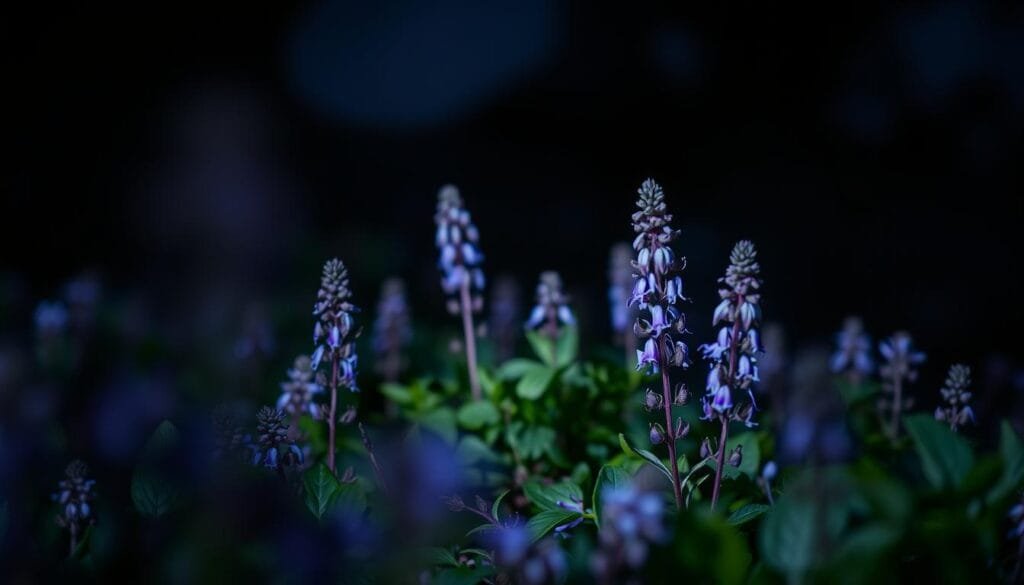I’ve struggled with insomnia and found natural remedies helpful. Valerian root is one such aid. It comes from the Valeriana officinalis plant and has been used for centuries to help with sleep and anxiety.
Valerian root became popular in Europe in the 17th century. It was used to treat stomach cramps. Today, Germany’s Commission E and the U.S. FDA recognize it as a mild sedative.
What excites me about valerian root is its ability to improve sleep quality. It can help you fall asleep faster. Studies show it may take a few weeks to see its full effects, but the results are promising.
I’m interested in valerian root as a natural sleep remedy. It’s often mixed with other herbs like hops and lemon balm. As someone who likes natural solutions, I’m excited to learn more about it.
What is Valerian Root: Understanding Nature’s Sleep Aid
Valerian, also known as Valeriana officinalis, is a plant with healing powers. It comes from Europe and Asia. People all over the world use it as a natural sleep aid and for other health issues.
Origin and Historical Use
Valerian root has been used for thousands of years. Ancient Greeks and Romans used it to help with anxiety, insomnia, and more. Today, it’s known for its calming effects and is a favorite for those looking for natural sleep solutions.
Plant Characteristics and Properties
Valerian grows up to 2 feet tall. It has unique flowers and dark green leaves. But the root is the most valuable part, packed with compounds that help with sleep and anxiety.
Active Compounds in Valerian
Research has found many active ingredients in valerian root. These work together to help with sleep and anxiety. Some of the key compounds include:
- Valerenic Acid: It calms the nervous system and may boost GABA activity.
- Valepotriates: These have sedative and anti-anxiety effects.
- GABA: A neurotransmitter that helps with sleep and reduces anxiety.
- Lignans, Flavonoids, and Essential Oils: These add to valerian’s healing powers.
These compounds together make valerian root a valuable natural remedy for sleep and anxiety problems.
The Science Behind Using Valerian Root for Sleep
Valerian root helps with sleep by affecting GABA receptors in the brain. GABA is a neurotransmitter that helps calm the nerves. The compounds in valerian, valerenic acid and valerenol, boost GABA levels. This leads to a calmer state and better sleep.
Valerian also affects serotonin and adenosine, which are key for sleep and mood. By working on these systems, valerian may help with insomnia and improve sleep quality.
| Statistic | Value |
|---|---|
| Percentage of adults worldwide with sleep problems | 30-40% |
| Percentage of elderly population with chronic sleep problems | Up to 25% |
| Percentage of primary care patients with insomnia | Up to 69% |
| Percentage of adults using valerian in the past week (U.S. survey) | 1.1% |
Many believe valerian can help with sleep, but the science is not clear. Some studies show positive results, but the research quality is a concern. Issues include small sample sizes and varied dosing.
“Valerian doses varied from 225 to 1215 mg per day, with only 2 studies mentioning standardized valerian extract.”
Despite these challenges, valerian might be a good natural choice for better sleep. Always talk to a healthcare professional before using valerian root.

How Valerian Root Works in Your Body
Valerian root is a natural remedy known for helping with sleep and relaxation. But how does it work? Let’s explore the science behind valerian’s effects on your body and sleep.
GABA and Sleep Regulation
Valerian root may help sleep by boosting the neurotransmitter GABA in the brain. GABA helps control the sleep-wake cycle by calming the brain. This makes it easier to fall and stay asleep. Valerian’s compounds might enhance GABA’s soothing effects.
Serotonin and Adenosine Effects
Valerian root also affects other neurotransmitters like serotonin and adenosine. Serotonin helps with mood and sleep, while adenosine causes drowsiness. Valerian’s compounds may increase these neurotransmitters, making it better at inducing sleep.
Impact on Sleep Architecture
Research shows valerian root can help you fall asleep faster and sleep better. It may improve the quality and duration of your sleep. This means you could wake up feeling more refreshed and energized.
The exact ways valerian root works are being studied. But, it seems to positively affect the brain’s neurotransmitters and sleep patterns. Always talk to a healthcare professional before trying new supplements.
Benefits of Valerian Root Beyond Sleep
Valerian root is known for helping people sleep better. But, new studies show it might help with more than just sleep. It could ease anxiety and help with menopause symptoms too.
A study of 60 trials with almost 7,000 people found valerian root helps sleep and eases anxiety. It improved sleep quality in 10 studies with over 1,000 participants. Also, 8 studies with 535 people showed it reduced anxiety.
Valerian root might also help with hot flashes and PMS. More research is needed to confirm this. But, the early signs suggest it could be a natural way to manage these symptoms.
It’s key to remember that valerian root affects people differently. Always talk to a doctor before using it. Yet, the research on valerian root is exciting. It shows promise for many health issues, not just sleep.

“Valerian root has been used for thousands of years for various medical purposes, including insomnia, anxiety, headaches, and stomach aches.”
Recommended Dosage and Timing for Sleep Support
Choosing the right form and dosage of valerian root is key for better sleep. It comes in capsules, tablets, tinctures, and teas. For the best sleep support, take 300-600 mg of valerian extract 30 minutes to two hours before bed.
Valerian tea is also a great option. Just steep 2-3 grams of dried root in hot water for 10-15 minutes. Drinking this tea before bed can help you relax and sleep better.
Different Forms of Valerian Supplements
- Valerian capsules or tablets – Standardized to contain a specific amount of active compounds like valerenic acids.
- Valerian tinctures – Liquid extracts that can be taken directly or added to drinks.
- Valerian teas – Made by steeping the dried root in hot water.
When to Take Valerian Root
For the best results, take valerian supplements 30 minutes to two hours before bed. This lets the active compounds work and help you sleep better. Always follow the dosage on your product and talk to a healthcare provider if you have questions.
“Valerian root has been used for centuries as a natural sleep aid. When taken correctly, it can help support a healthy sleep-wake cycle.”
Potential Side Effects and Safety Considerations
Valerian root is usually safe, but it can cause mild side effects. These might include headaches, dizziness, stomach issues, and vivid dreams. Rarely, it might harm the liver, mainly when mixed with other herbs. It can also make you feel very sleepy, so don’t drive or use heavy machinery after taking it.
Pregnant women, nursing mothers, and children should talk to a doctor before using valerian root. The long-term use of valerian is not well-studied. People with health issues or on medications should also check with their doctor to make sure it’s safe.
The U.S. Food and Drug Administration (FDA) hasn’t approved valerian root for medical use. But, they suggest reading labels, looking for USP, and buying from known companies for quality.
Some people might have allergic reactions to valerian root. This could be a skin rash, itching, hives, or swelling. Keep valerian root in a cool, dry place and throw away any left over after it expires.
The safety and effectiveness of valerian root for issues like insomnia and anxiety are not clear. Always talk to a healthcare provider before using it, if you’re on medications or have health problems.

The National Center for Complementary and Integrative Health (NCCIH) says valerian is safe for short-term use. But, the long-term safety of valerian is unknown.
Drug Interactions and Precautions
Valerian root can help you sleep better, but it’s key to know about its drug interactions. It can seriously interact with at least 67 drugs and moderately with 43. This includes sedatives, anticonvulsants, and some antidepressants. Also, valerian can make other drugs more potent, so be careful with alcohol or other sleep aids.
Medications to Avoid
- Sedatives, such as benzodiazepines and barbiturates
- Anticonvulsants, like phenytoin and carbamazepine
- Some antidepressants, including selective serotonin reuptake inhibitors (SSRIs) and monoamine oxidase inhibitors (MAOIs)
- Drugs metabolized by the CYP3A4 enzyme, such as irinotecan and certain statins
Special Population Considerations
People on medications or with health issues should talk to their doctor before using valerian. Certain groups need extra care:
- Pregnant women and breastfeeding mothers should avoid valerian due to insufficient safety data
- Children and adolescents should use valerian only under the guidance of a healthcare professional
- Patients scheduled for surgery should discontinue valerian use at least two weeks before the procedure, as it may interact with anesthesia
Talking to your doctor about valerian root or any supplement is always a good idea. This is true if you’re on medications or have health issues. Knowing about drug interactions and safety helps you use valerian safely and effectively.

How Long Does it Take for Valerian Root to Work
Using valerian root for sleep can vary. Some see benefits right away, while others take 2-4 weeks. It depends on the person.
For the best results, use valerian root regularly. Studies show its effects grow stronger with time. Being patient and consistent is key.
For insomnia, take 300 to 600 milligrams before bed. For anxiety, 120 to 200 milligrams three times a day is recommended.
| Condition | Recommended Dosage | Timing |
|---|---|---|
| Insomnia | 300 to 600 mg | 30 minutes to 2 hours before bedtime |
| Anxiety | 120 to 200 mg | Three times per day |
Valerian root’s effectiveness can vary. If you don’t see results, talk to a healthcare professional. They can help find other solutions or address sleep and anxiety issues.
“Valerian’s effects may become more pronounced with continued use over several weeks.”
Choosing Quality Valerian Root Supplements
When picking valerian supplements for better sleep, it’s key to choose high-quality ones. Look for products with 0.3-0.8% valerenic or valeric acid. These are the main active parts of valerian root.
Also, pick reputable brands that test their products for purity and quality. This ensures the supplement is safe and effective. Always check the label for extra ingredients and allergens.
What to Look for on Labels
- Standardized to 0.3-0.8% valerenic or valeric acid
- Third-party tested for quality and purity
- No unnecessary additives or fillers
- Clearly labeled as to the form of valerian (extract or root powder)
- Transparent about source and manufacturing practices
Storage and Shelf Life
Valerian supplements last 1-2 years if stored right. Keep them in a cool, dry spot, away from sunlight and moisture. Don’t store them in warm, damp places, as it can harm the active parts.
“When it comes to valerian supplements, quality matters. Look for standardized extracts that have been third-party tested to ensure you’re getting a consistent, reliable product.”
By choosing high-quality valerian supplements, you can trust their quality and effectiveness. This helps you get the most out of them for better sleep and relaxation.
Natural Alternatives to Valerian Root
If you’re looking for a natural sleep aid, there are many options. Herbs like chamomile, passionflower, and lemon balm can help you relax and sleep better. Even the “sunshine hormone” melatonin can support healthy sleep.
Some people find that mixing herbs works better than one alone. A mix of valerian, passionflower, and hops can help you sleep longer and feel less anxious. Also, changing your sleep habits, like going to bed at the same time every night, can greatly improve your sleep.
But remember, natural sleep aids might not solve all sleep problems. If you can’t sleep well for a long time, talk to a doctor. They can find out why you’re having trouble sleeping.
Herbal Alternatives to Consider
- Chamomile: Studies show that chamomile can help older adults sleep better, possibly because it lowers anxiety.
- Passionflower: Passionflower extract can help people with insomnia sleep better than a placebo.
- Lemon Balm: This herb is known for its calming effects and might help you sleep a bit better.
- Melatonin: Melatonin supplements can help with sleep disorders like jet lag and delayed sleep-wake phase disorder.
Always talk to a doctor before trying new supplements or herbs, even if you’re healthy. This is very important if you have health issues or take medicine.
| Natural Sleep Aid | Key Benefits | Dosage Range |
|---|---|---|
| Chamomile | Improved sleep quality, reduced anxiety | 200-400 mg, 1-2 times daily |
| Passionflower | Enhanced sleep parameters, reduced insomnia | 300-600 mg, 30-60 minutes before bedtime |
| Melatonin | Improved sleep quality and duration, special for shift workers | 0.5-5 mg, 1-2 hours before bedtime |
While these natural options might help, it’s key to find out why you’re having trouble sleeping. Work with a doctor to create a plan that helps you sleep well.
Research and Clinical Studies on Valerian’s Effectiveness
Valerian root has been studied a lot for its sleep benefits. Some studies show promise, but the evidence is mixed. More research is needed to fully understand its effects.
A 2020 review looked at 60 studies on valerian for sleep. It found valerian might be safe and effective. But, a 2007 study with 405 adults showed only a small improvement in sleep. A 2011 study with 227 patients found no big difference in sleep quality compared to a placebo.
Many studies found valerian to be safe, with side effects like headaches and drowsiness. Diarrhea was more common in valerian groups than in placebo groups, according to two studies.
Valerian’s effects on other drugs are not well understood. It’s best to avoid using it with other sleep aids. It might also affect the CYP3A4 enzyme, but the exact effect is unclear.
In summary, valerian’s effectiveness for sleep is not fully proven. But, it’s usually safe and might help some people sleep better. More large-scale studies are needed to confirm its benefits as a natural sleep aid.
| Key Findings | Details |
|---|---|
| Valerian Popularity | Valerian is one of the most popular herbs sold in US retail stores, as per a survey investigating herbal product popularity. |
| Insomnia Prevalence |
|
| Valerian Research Summary |
|
The research on valerian’s effectiveness for clinical trials, meta-analysis, and sleep quality improvement suggests it may offer some benefits. Yet, more high-quality studies are needed to confirm its role as a natural sleep aid.
Lifestyle Tips for Maximizing Valerian Root Benefits
To get the most out of valerian root, you need to add healthy habits to your routine. Going to bed and waking up at the same time every day is important. This helps your body get into a rhythm.
Also, try a calming bedtime routine. This could be a warm bath or some gentle stretches. It tells your body it’s time to relax.
Watch what you drink in the evening. Caffeine and alcohol can mess with your sleep. Caffeine can keep you awake, and alcohol might make you sleepy at first but then wake you up later.
Exercise and stress-reducing activities like meditation or deep breathing are also good. They work well with valerian root to help you sleep better.
Valerian root is a natural aid, not a cure-all for sleep. But when you use it with good sleep habits, you’ll sleep better. Your body will thank you for it.







